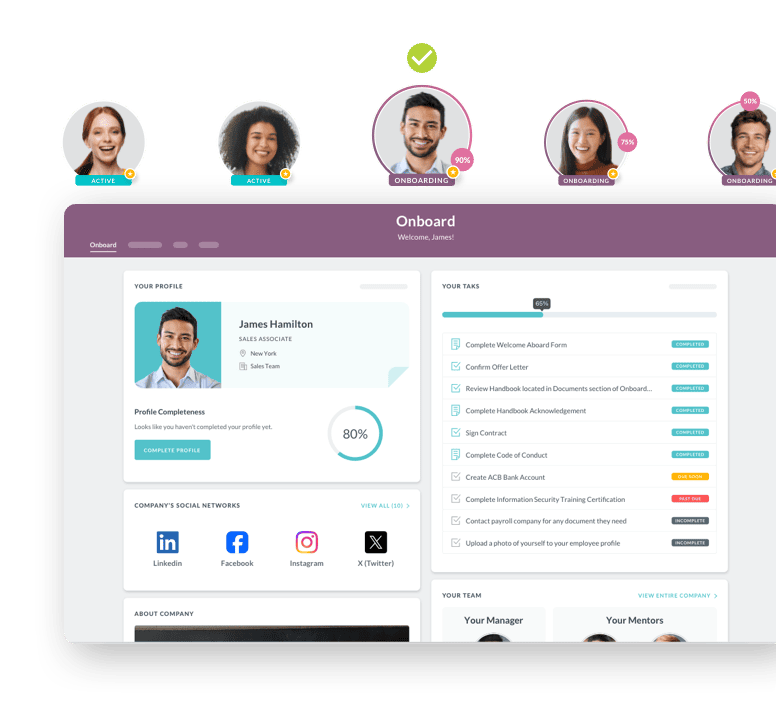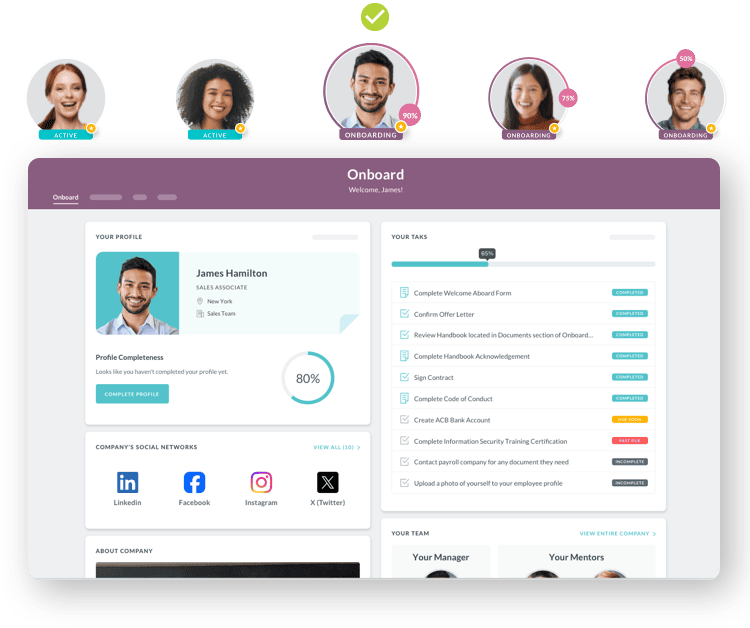Background Check

 Cut onboarding time
by 60%—here's the
Ultimate Checklist
that helped do it.
Cut onboarding time
by 60%—here's the
Ultimate Checklist
that helped do it.

A background check is a process an employer uses to check a person's identity, skills, and past before offering them a job. This is a very important part of hiring. It helps companies make smart choices and avoid problems. A full background check can look at many things. It might check for a criminal record, confirm past jobs and schooling, and look at credit history. The main goal is to make sure the information a person gives is true. It also helps to see if they are a good fit for the job and the company.
Key Parts of a Background Check
Background checks are not all the same. The checks done depend on the job and the type of company. Here are some of the most common types:
Criminal History Check:
This is what most people think of. It looks in local, state, and national police records for major and minor crimes. It is very important for jobs that work with kids, old people, or private information.
Employment Verification:
This part confirms a person's work history. It checks job titles, dates they worked, and sometimes why they left. It makes sure the work history on their resume is real. Many companies use an applicant tracking system (ATS) to make this process easier.
Education Verification:
This makes sure a person's degrees, diplomas, and other schooling are real. It's a simple way to stop lying and confirm a person has the right training for the job.
Credit History Check:
For jobs that handle money, a credit check may be needed. It shows a person's money habits, like if they have a lot of debt or have paid bills late. This can show if a person is responsible and can be trusted.
Driving Record (MVR) Check:
If a job needs a person to drive a company car, a Motor Vehicle Record check is needed. It shows a person's driving history, like accidents, tickets, and if their license is good.
Drug Screening:
Many companies, especially those with safety jobs, ask for drug tests. This helps to keep a workplace safe and is often a rule for getting the job.
How the Background Check Process Works
Knowing how a background check is done is key to a smooth and legal hiring process. Here are the basic steps:
Make a Clear Rule:
First, set a fair rule for all people who apply. Decide what checks you will do and for which jobs. This helps to avoid being accused of treating people unfairly.
Get Written OK:
This is the most important step. You must get a person's clear, written permission to do a check. A law called the Fair Credit Reporting Act (FCRA) says you must tell them you will do a check and that it might be used to decide on a job offer. Without this OK, you cannot do the check.
Get Needed Info:
Collect the person's full name, birth date, Social Security number, and other facts needed by the check service.
Run the Check:
Use a professional service to do the checks you have planned. This makes sure the information is correct and you follow all the laws. Many HR tools, like HR Cloud's onboarding software, can work with these services to manage the process well.
Review the Results:
When you get the report, check it against your company's hiring rules. Look for red flags or things that don't match. But don't make a fast choice. You can make this part faster with an automated onboarding solution that flags issues for you to review.
Take Action:
If the results make you want to not offer the job, you must follow the FCRA's steps. This means you have to tell the person, give them a copy of the report, and give them a chance to fix any mistakes in it.


Good Rules and Mistakes to Avoid
Doing background checks the right way takes care. By following good rules, you can make a process that is both fair and legal.
Good Rules
Make It the Same for Everyone:
Do the same type of background check for all people who apply for the same type of job. This helps stop claims of unfair treatment.
Work with a Good Partner:
A good background check company, or Consumer Reporting Agency (CRA), knows the complex laws. They help make sure you follow the FCRA.
Be Open with People:
Tell people upfront about your background check rule. Tell them what you will be looking for and the steps you will take. This builds trust and gives them a better feeling about the process. This can be done as part of the initial recruitment and talent acquisition phase.
Focus on the Job:
Only check for information that is directly important to the job. For example, a credit check for a cleaner is likely not needed, but it would be for an accountant.
Know the Laws:
Laws about background checks are always changing. This includes "ban the box" laws. Check your rules often to make sure they are still legal.
Mistakes to Avoid
Not Getting Written OK:
Doing a background check without a person's signed OK is a big legal risk and breaks the FCRA law.
Not Being Fair:
Doing different types of checks for people for the same job, based on your own feelings, is a form of unfair treatment. This can lead to lawsuits. For a more fair process, consider the benefits of implementing a DEI strategy in your hiring.
Not Following the Rules to Say No:
If you decide not to hire someone because of their background check, you must follow the needed steps to tell them. Not doing so can lead to big legal fines.
Using Old or Wrong Info:
Using info from bad sources or old data can lead to hiring mistakes and legal issues. Always use a professional service that gives current and correct information.
Forgetting "Ban the Box" Laws:
Many places have "ban the box" laws. These laws stop bosses from asking about a person's criminal past on the first job form. Be sure your forms and rules follow these laws.
Parts of a Background Check at a Glance
|
Type of Check |
What it Checks For |
Best For... |
Things to Remember |
|
Criminal History |
Crimes, major and minor |
All jobs, especially those with sensitive data or people. |
Must follow "ban the box" and other state laws. |
|
Employment Verification |
Job titles, dates of work, past bosses |
All jobs to check a resume. |
Past bosses may only give a little bit of information. |
|
Education Verification |
Degrees and schooling |
Jobs that need specific degrees or licenses. |
Helps stop people from lying on their resumes. |
|
Credit History |
Debt, late payments |
Jobs that handle money. |
Must be important for the job and follow FCRA laws. |
|
Driving Record (MVR) |
License status, tickets |
Jobs that require driving a company vehicle. |
Important for insurance and safety. |
|
Drug Screening |
Illegal substances |
Safety-sensitive jobs, or as required by law. |
Needs a clear rule that is fair to everyone and follows local laws. |
What is Happening Now and Next
Background checks are used in many different types of work. Each type has its own needs and rules. The future of background checks is also changing with new technology and laws.
Jobs with Special Needs
Healthcare:
Checks here are very important for keeping patients safe. They often look for a criminal past and check to see if a person is on a list of people who have harmed others. For an example of how HR can influence this sector, read creating a culture of care.
Finance:
Jobs in this area need people who can be trusted with money. Checks often include credit history and criminal past.
Education:
Keeping students safe is the most important thing. Schools often do full criminal checks, including checks of sex offender lists.
Transportation:
Drivers must get MVR checks and regular drug tests to keep the public safe.
Future Ideas and Trends
The world of background checks is changing. Here are some new ideas:
Checks All the Time:
Instead of just one check at the start, some companies are trying to check records all the time. This means they watch for new crimes or driving tickets. This needs careful management and clear rules.
AI and Computers:
New tech like AI is being used to do parts of the check, like putting in data. This makes the process faster and has fewer errors. To see how AI is changing the process, check out this article on how AI is reshaping the onboarding process for HR.
Private Data:
As more data is available, the need for strong data privacy is growing. Companies must make sure they are keeping a person's private information safe.
Social Media Checks:
Looking at a person's public social media pages is becoming more common. Bosses might do this to see if a person is professional. But this can lead to legal and moral risks.
Keep Reading
Caregiver Turnover in Home-Based Care: 5 Fixes That Actually Work
Home healthcare agencies face alarming turnover rates of 75%, with most caregivers
10 Workforce Management Issues Hospitals and Home Care Teams Face (and What Fixes Them Fast)
"We're hemorrhaging nurses faster than we can replace them, and our current systems can't
Key Elements of an Effective Manufacturing Onboarding Checklist
Manufacturing onboarding requires specialized checklists addressing safety compliance,
Ready to streamline your onboarding process?
Book a demo today and see how HR Cloud can help you create an exceptional experience for your new employees.

